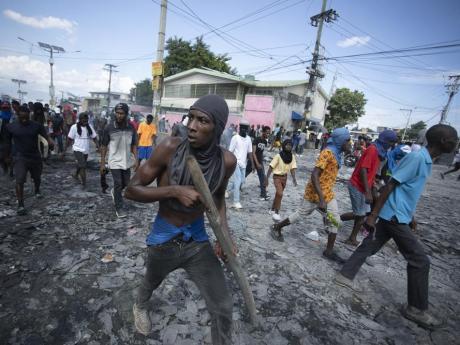Haiti at breaking point as economy tanks and violence soars
PORT-AU-PRINCE, Haiti (AP) — Daily life in Haiti began to spin out of control last month just hours after Prime Minister Ariel Henry said fuel subsidies would be eliminated, causing prices to double.
Gunshots rang out as protesters blocked roads with iron gates and mango trees.
Then Haiti's most powerful gang took a drastic step: It dug trenches to block access to the Caribbean country's largest fuel terminal, vowing not to budge until Henry resigns and prices for fuel and basic goods go down.
The poorest country in the Western hemisphere is in the grips of an inflationary vise that is squeezing its citizenry and exacerbating protests that have brought society to the breaking point. Violence is raging and making parents afraid to send their kids to school; fuel and clean water are scarce; hospitals, banks and grocery stores are struggling to stay open.
Life in Haiti is always extremely difficult, if not downright dysfunctional. But the magnitude of the current paralysis and despair is unprecedented. Political instability has simmered ever since last year's still-unsolved assassination of Haiti's president; inflation soaring around 30% has only aggravated the situation.
“If they don't understand us, we're going to make them understand,” said Pierre Killick Cemelus, who sweated as he struggled to keep pace with thousands of other protesters marching during a recent demonstration.
The fuel depot blocked by gangs has been inoperable since Sept. 12, cutting off about 10 million gallons of diesel and gasoline and more than 800,000 gallons of kerosene stored on site. Many gas stations are closed, and others are quickly running out of supplies.
The lack of fuel recently forced hospitals to cut back critical services and prompted water delivery companies to shut down. Banks and grocery stores also are struggling to stay open because of dwindling fuel supplies — and exorbitant prices — that make it nearly impossible for many workers to commute.
Gangs have long wielded considerable power in Haiti, and their influence has only grown since the July 2021 assassination of President Jovenel Moïse.
Gangs control roughly 40% of Port-au-Prince, the United Nations has estimated. They are fighting to control even more territory, killing hundreds of Haitians in recent months — including women and children — and driving away some 20,000 people from their homes. Kidnappings have spiked.
Henry has pledged to hold elections as soon as it's safe to do so, writing in a speech read at the United Nations General Assembly on Sept. 24 that he has “no desire to stay in power longer than necessary.”
Follow The Gleaner on Twitter and Instagram @JamaicaGleaner and on Facebook @GleanerJamaica. Send us a message on WhatsApp at 1-876-499-0169 or email us at onlinefeedback@gleanerjm.com or editors@gleanerjm.com.

